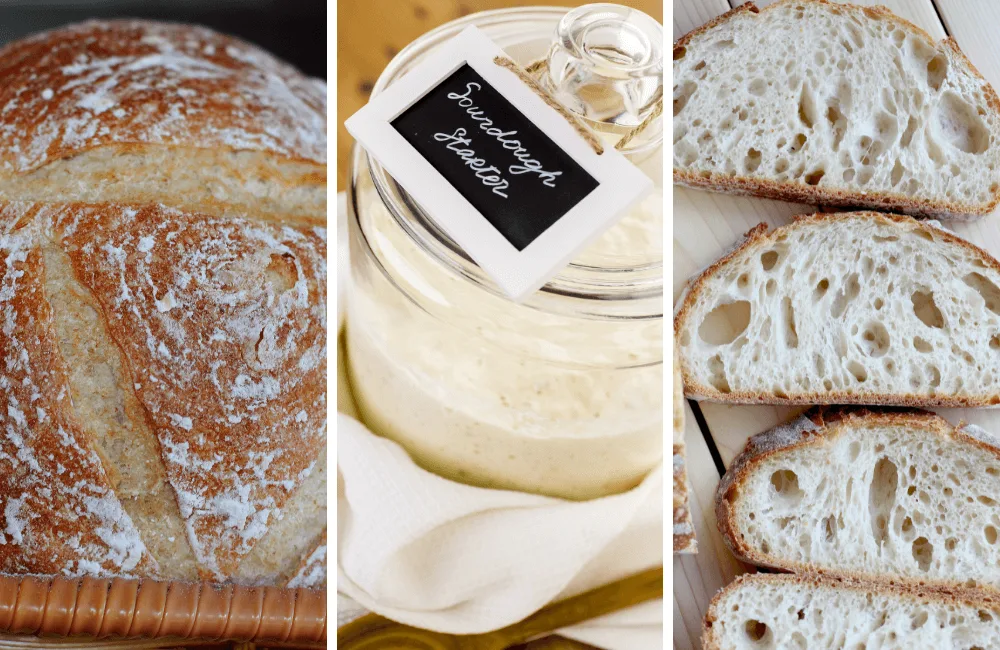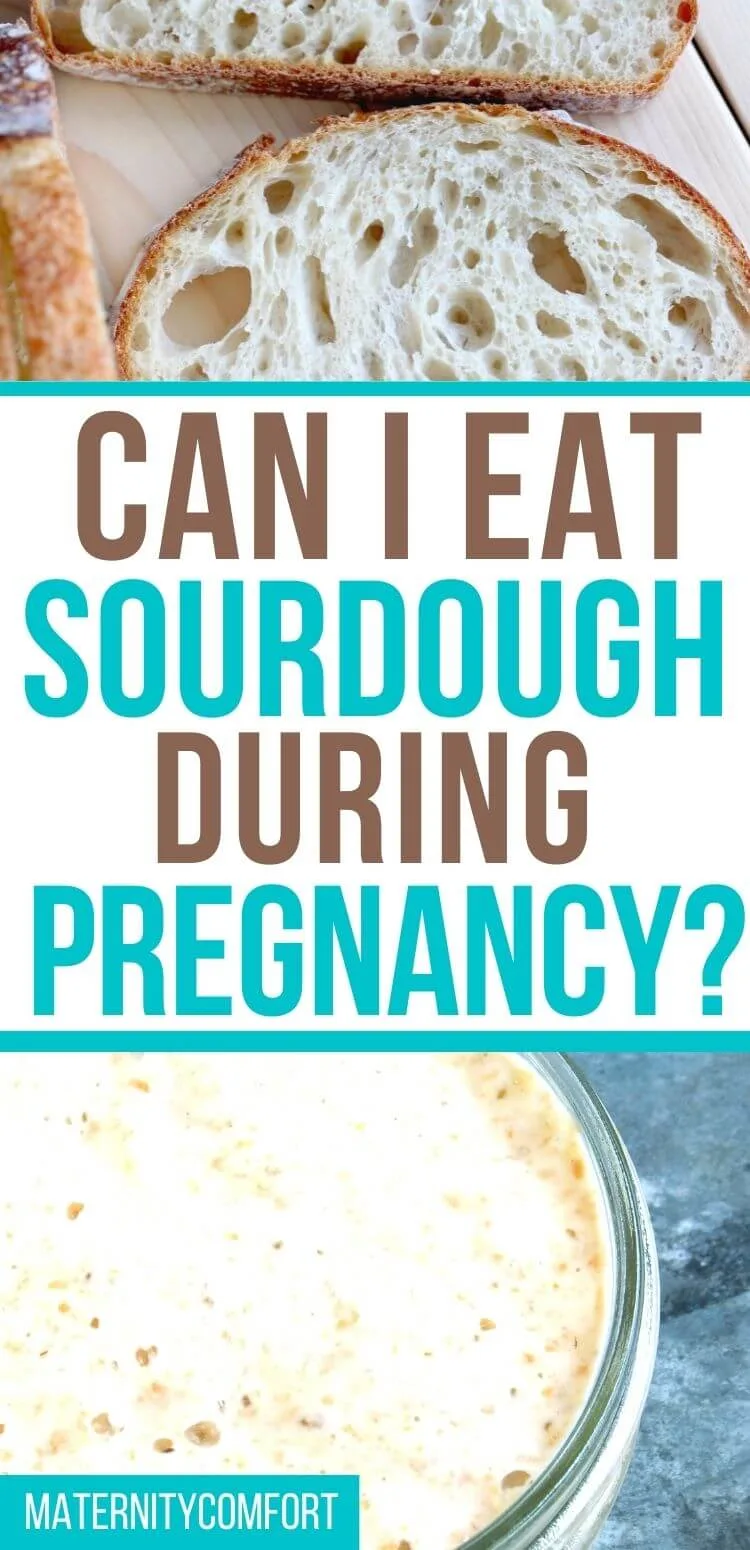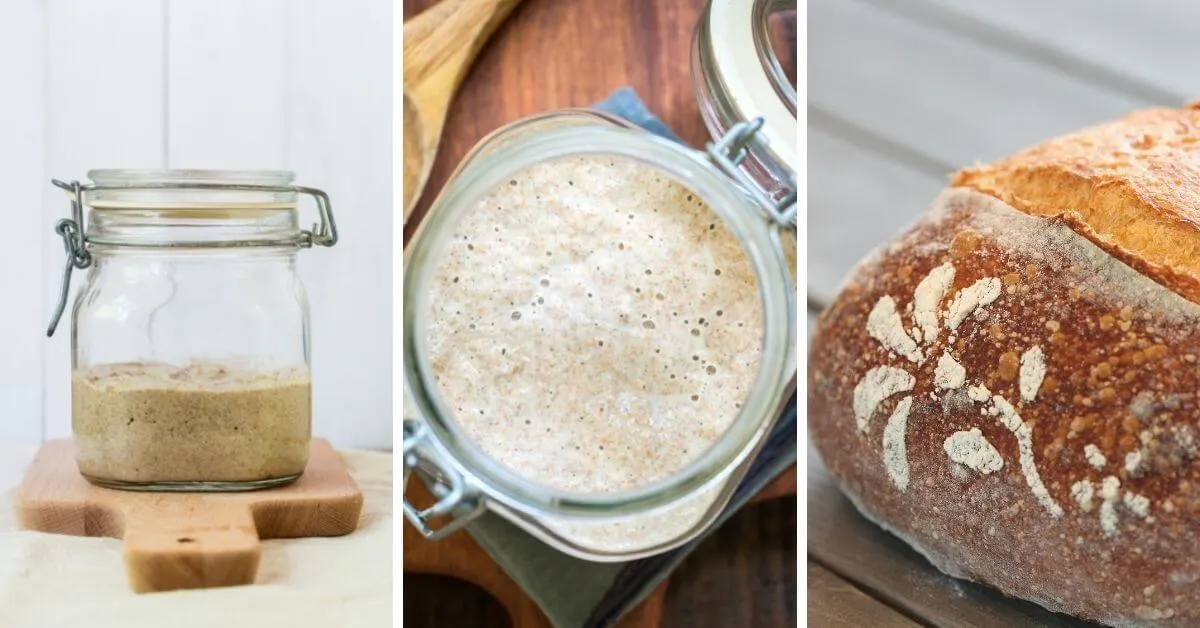Updated May 8, 2023
Can you eat sourdough while pregnant? There are many pregnant women who want to know.
When thinking about foods to eat during pregnancy, the word “sour” or “fermented” often raises questions about whether the food item is safe to eat during pregnancy.

Those who make homemade sourdough bread are particularly interested in knowing whether sourdough is safe during pregnancy because of the sourdough starter used to make bread.

So … can you eat sourdough while pregnant?
The answer is YES for a number of reasons!
In fact, sourdough is an excellent source of nutrition while pregnant!
Sourdough bread is an excellent source of niacin, calcium, folate, and magnesium which are all necessary for a healthy pregnancy.
Why is sourdough sour?
There are many people who want to know what makes sourdough sour?
The sour taste has to do with the fermentation process unique to making sourdough bread.
Commercial baker’s yeast is used for most leavened bread but not sourdough bread.
Fermentation of sourdough bread uses Wild Yeast since this form of yeast can work in an acidic environment with lactic-acid bacteria.
The sour taste is a result of the acetic and lactic acids produced by the bacteria in the sourdough starter.
Lactic acid bacteria are also found in other foods such as yogurt and kimchi which are great for gut health.
Sourdough is safe and healthy to eat during pregnancy for a number of reasons:
- Less blood sugar fluctuations because it takes longer to digest.
- Though it takes longer to digest, it is also easier to digest because of the enzymes released during fermentation.
- Folate, which is important for the development of the fetal nervous system, is higher when fermentation occurs with wild yeast instead of commercial baker’s yeast. How much folic acid is in sourdough bread?
Fermented bread pregnancy
There are many old wives’ tales about pregnancy and diet, and one of the most persistent is the idea that pregnant women should avoid fermented bread.
However, there is no scientific evidence to support this claim. In fact, fermented bread can actually be a healthy part of a pregnant woman’s diet.
Fermented bread is made with live bacteria, which can help to improve gut health.
This is important for pregnant women because a healthy gut can help to reduce the risk of pregnancy complications like preterm labor.
In addition, fermented bread is a good source of vitamins and minerals, including folic acid, which is essential for pregnant women.
So if you’re pregnant and craving some sourdough, go ahead and indulge – it’s good for you!
Making sourdough bread is a very different process than what is involved to make other bread.
In order to make sourdough bread, you need to use a sourdough starter.
Watch this video now to see all the amazing benefits of sourdough!
Sourdough Starter
Sourdough starter is a combination of yeast and bacteria and neither is bad for your health:
- Acid bacteria culture
- Wild yeast
The flavor is determined by the proportion of lactic acid bacteria and acetic acid bacteria.
If the starter is processed to allow the lactic acid bacteria to thrive the sourdough will have a mild sour taste.
If the acetic acid bacteria are the dominant growing bacteria, the sourdough will have a stronger sour flavor.
- Lactic acid bacteria (milk products) mild taste
- Acetic acid bacteria (vinegar) strong taste
Specific factors involved in preparing the starter solution will cause different bacteria to thrive and this gives a different taste to the bread:
- Temperature: A colder temperature will cause acetic acid bacteria to thrive and the sourdough will be sourer. If the starter is at room temperature the lactic acid bacteria will be dominant and the bread will be less sour.
- Frequency of feeding the starter solution
- Amount of starter
- Duration of fermentation

Some general questions asked about sourdough bread:
-
Is it safe to eat sourdough starter?
Sourdough bread has a long and storied history, dating back to ancient Egypt.
Since then, it has become a staple in kitchens around the world.
Sourdough starter is a key ingredient in sourdough bread, and it is made by combining flour and water and allowing the mixture to ferment.
This process allows wild yeast and bacteria to grow, which gives sourdough its distinct flavor.
Sourdough starter can also be used to make other fermented foods like beer or yogurt.
While there is some debate about whether the sourdough starter is safe to eat, the consensus seems to be that it is generally harmless.
However, it is important to use a starter that has been well-cared for and has not been allowed to spoil.
If you are unsure about the safety of your starter, it is best to err on the side of caution and throw it out.
-
Are there any side effects of eating sourdough bread?
Other than side effects one might experience when eating gluten, yogurt, or vinegar the side effect some might experience as a result of eating sourdough bread is gas or bloating.
There are a few potential side effects to keep in mind when eating sourdough bread.
For example, some people may experience bloating or gas after eating sourdough bread.
And while sourdough bread is generally safe for most people, those with gluten sensitivities may want to avoid it.
Ultimately, whether or not you enjoy eating sourdough bread is a matter of personal preference.
-
Can you eat too much sourdough bread?
As mentioned above, you could eat too much or react to sourdough with gas and bloating because sourdough bread alters the intestinal flora.
-
Can you eat sourdough bread with gluten intolerance?
Sourdough bread is not gluten-free. One option is to prepare a sourdough starter with gluten-free ingredients.
-
How much folic acid in sourdough bread?
Folic acid is a water-soluble vitamin and it is mainly found in leafy green vegetables and fruits.
It is also found in animal products such as the liver and kidneys. Yeast is also a good source of folic acid.
One hundred grams of sourdough bread contains approximately 0.37 micrograms of folate (Dietary Folate Equivalents).
The amount of folic acid found in sourdough bread will depend on the flour used, the fermentation time, and the temperature.
Adding folic acid to flour helps to increase the level of this vitamin in bread. However, the high temperatures used in baking can destroy some of the folic acids.
Some commercial bakeries add folic acid to their flour to help reduce neural tube defects in babies.
There are approximately 95 micrograms of folate in a medium-sized slice of sourdough bread.
List of foods to not eat when pregnant:
- Foods that are not pasteurized- certain types of cheese like soft cheeses, Brie, Blue Cheese, etc.
- Certain types of fish- shark, swordfish, anything high in mercury
- Raw eggs including egg nog, hollandaise sauce, homemade mayonnaise, and runny eggs.
- Undercooked meats- lunch meats.
- Hot foods that are not “hot”, avoid hot foods that have been sitting out without a warming source. Same for foods that should be eaten cold. If there is no ice or refrigeration source keeping the food cold, take a pass.
- Caffeine- soda, chocolate. (Limit your caffeine to less than 200 mg a day)
- Herbal Teas (There are so many ingredients in herbal teas so it is best to avoid them simply. Green tea is OK.)
Final Thoughts
During pregnancy, sourdough bread (as long as it is prepared correctly) is a great source of nutrition and can be considered to be one of the foods to eat during pregnancy.
The words “sour” and “fermentation” are no more a concern than eating a cup of yogurt.
The two acids (acetic and lactic acid) are what contribute to the taste and are found in vinegar, yogurt, and many other foods we eat every day.



